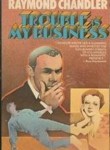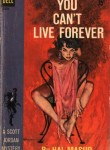December 8, 2020
 Well, it’s nearly time after a fair number of swell quotes to say so-long (for now – he’ll be back) to Raymond Chandler, with one last Cocktail Talk from a story within the collection Trouble Is My Business and Other Stories, this time “Red Wind,” which starts with the below quote that has a wind indeed in it. It’s a twisty kind of tall, beginning with that wind and a bar that’s across the street from Chandler’s PI Philip Marlowe’s apartment. Then there’s a lady, various angles, and lots of gumshoe-ing. Start it off with the below, and then read the whole story whydontcha? Oh, and also don’t miss all the other Raymond Chandler Cocktail Talks, cause you deserve to read them.
Well, it’s nearly time after a fair number of swell quotes to say so-long (for now – he’ll be back) to Raymond Chandler, with one last Cocktail Talk from a story within the collection Trouble Is My Business and Other Stories, this time “Red Wind,” which starts with the below quote that has a wind indeed in it. It’s a twisty kind of tall, beginning with that wind and a bar that’s across the street from Chandler’s PI Philip Marlowe’s apartment. Then there’s a lady, various angles, and lots of gumshoe-ing. Start it off with the below, and then read the whole story whydontcha? Oh, and also don’t miss all the other Raymond Chandler Cocktail Talks, cause you deserve to read them.
There was a desert wind blowing that night. It was one of those hot dry Santa Anas that come down through the mountain passes and curl your hair and make your nerves jump and your skin itch. On nights like that, meek little wives feel the edge of the carving knife and study their husbands’ necks. Anything can happen. You can even get a full glass of beer at a cocktail lounge.
I was getting one in a flossy new place across the street from the apartment house where I lived. It had been open about a week and it wasn’t doing any business. The kid behind the bar was in his early twenties and looked as if he had never had a drink in his life.
–Raymond Chandler, “Red Wind”
November 20, 2018

Wow, I haven’t had a lot of David Goodis on here (I think just
one Goodis post) – which is a shame, cause I love his work. Maybe it’s just too downbeat? Maybe when they drink it feels almost, oh, the opposite of the jolly drinking I tend to applaud? Maybe it’s just bad timing? – nearly all of his characters have a lot of bad timing. But he (though not as revered here in the U.S. as he should be, or maybe not as
well-known is a better way to put it, as his devotees are devoted, and I say U.S. cause he’s bigger in France, where most of his books have been made into movies, and where the only scant biography of him has been published) is a subtle master of pacing and language, and an obvious master of writing about the down and out and the nowhere to go and the last chance has already faded into the past, the back alleys and longshores and shabby bars that become nearly family for those who inhabit their shady, scruffy, barstools to nowhere.
Shoot The Piano Player may be his best-known book, or at least one with
Dark Passage the other, as it was made into a movie by François Truffaut, and it’s a worthy read unless you’re looking for some sort-of peppy ending. Lots of it centers around a bar, Harriet’s Hut. Not the nicest place, but a popular joint, as the below description tells us.
At the bar the Friday night crowd was jammed three-and-four-deep. Most of the drinkers wore work pants and heavy-soled work shoes. Some were very old, sitting in groups at the tables, their hair white and their faces wrinkled. But their hands didn’t tremble as they lifted beer mugs and shot glasses. They could still lift a drink as well as any Hut regular, and they held their alcohol with a certain straight-seated dignity that gave them the appearance of venerable elders at a town meeting.
—Shoot the Piano Player, David Goodis
November 22, 2016
 See, I told you (in Part I) that I’d probably have a second quote from Hal Masur’s (aka Harold Q. Masur) lawyer-y pulp-y book from last century, You Can’t Live Forever. And here we are! Check out the below, and know that I can predict the future.
See, I told you (in Part I) that I’d probably have a second quote from Hal Masur’s (aka Harold Q. Masur) lawyer-y pulp-y book from last century, You Can’t Live Forever. And here we are! Check out the below, and know that I can predict the future.
It was a nice quiet bar on a side street off Park Avenue, cool and dim and silken, a high-class oasis with retiring waiters and a hushed atmosphere. The chairs were softly pliant to make you comfortable and the pretzels crisp and dry to keep you thirsty. Enclosed booths ringed the room and smoke wove a gauze-like web that hung motionless in the still air.
We were on our third pair of Martinis and were calling each other by our first names. Conversation so far had been limited to that polite badinage used between two people on mutual fishing expeditions. I was in rare form.
— Hal Masur, You Can’t Live Forever
Tags: bar, Bars, Cocktail Talk, Hal Masur, Harold Q. Masur, Martini, polite badinage, You Can’t Live Forever
Posted in: Bars, Cocktail Talk, Gin, vermouth
 Well, it’s nearly time after a fair number of swell quotes to say so-long (for now – he’ll be back) to Raymond Chandler, with one last Cocktail Talk from a story within the collection Trouble Is My Business and Other Stories, this time “Red Wind,” which starts with the below quote that has a wind indeed in it. It’s a twisty kind of tall, beginning with that wind and a bar that’s across the street from Chandler’s PI Philip Marlowe’s apartment. Then there’s a lady, various angles, and lots of gumshoe-ing. Start it off with the below, and then read the whole story whydontcha? Oh, and also don’t miss all the other Raymond Chandler Cocktail Talks, cause you deserve to read them.
Well, it’s nearly time after a fair number of swell quotes to say so-long (for now – he’ll be back) to Raymond Chandler, with one last Cocktail Talk from a story within the collection Trouble Is My Business and Other Stories, this time “Red Wind,” which starts with the below quote that has a wind indeed in it. It’s a twisty kind of tall, beginning with that wind and a bar that’s across the street from Chandler’s PI Philip Marlowe’s apartment. Then there’s a lady, various angles, and lots of gumshoe-ing. Start it off with the below, and then read the whole story whydontcha? Oh, and also don’t miss all the other Raymond Chandler Cocktail Talks, cause you deserve to read them.






















